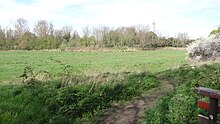
Derwent Floodwash is a 1.8 hectare Local Nature Reserve and Site of Borough Importance for Nature Conservation, Grade II, in Morden Park in the London Borough of Merton. It is owned by the London Borough of Wandsworth and managed by Merton Council. The site borders Pyl Brook, and it is designed to store flood waters when the brook overflows, preventing flooding of properties downstream.[1][2][3]
The Floodwash is a wet meadow which has uncommon flower species, such as spiked sedge and grass vetchling. Ponds have been created around the edges, which support dragonflies in the summer.[3]
There is access from Derwent Road.[1]
References[edit]
- ^ a b "Derwent Floodwash". Local Nature Reserves. Natural England. 4 March 2013. Retrieved 6 April 2014.
- ^ "Map of Derwent Floodwash". Local Nature Reserves. Natural England. Retrieved 6 April 2014.
- ^ a b "Derwent Road Flood Wash". Greenspace Information for Greater London. 2013. Archived from the original on 7 April 2014. Retrieved 6 April 2014.
Well, that’s interesting to know that Psilotum nudum are known as whisk ferns. Psilotum nudum is the commoner species of the two. While the P. flaccidum is a rare species and is found in the tropical islands. Both the species are usually epiphytic in habit and grow upon tree ferns. These species may also be terrestrial and grow in humus or in the crevices of the rocks.
View the detailed Guide of Psilotum nudum: Detailed Study Of Psilotum Nudum (Whisk Fern), Classification, Anatomy, Reproduction